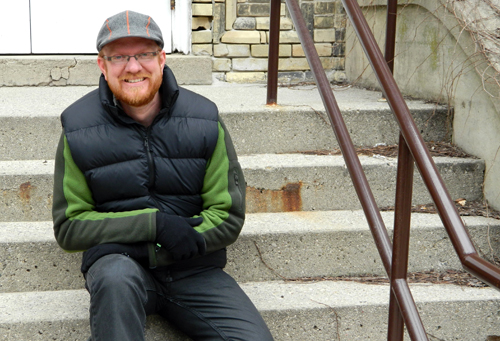
You signed up for Twitter. Everyone else was doing it, and it seemed like a good idea. But you couldn’t figure out what to do and you were quickly overwhelmed. Now you haven’t logged in for months and you think you’ve forgotten your password.
That story’s all too familiar to Kyle Mackie, manager, teaching and learning technologies at the Centre for Open Learning and Educational Support. “I’m not an expert – there are no real experts in this – but I do have some opinions, and a fair amount of experience using social media,” says Mackie.
That’s led a number of people to ask him for advice, and he’s offered workshops for staff, faculty and students interested in adding social media to their communications strategies. That includes his recent presentation at the library’s Writers’ Workshop on “Twitter: 140 Characters of Awesome.”
Mackie suggests that people should start by deciding what they hope to accomplish by using social media. He calls them “social tools” to remind people that they are simply a tool, something to use to reach a goal. “Some people are hoping to market themselves, some want to connect with other people doing similar work,” he explains.
Mackie uses various social tools throughout his workday: “They help me do my work. I have made connections to people through Twitter who have helped me with technical hurdles and who have told me about opportunities to speak at conferences, for example. It’s also a lot of fun – for me, that’s a byproduct of being effective.”
Once you know what your goals are, he suggests researching the tools you are considering. Mackie has both professional and personal blogs, a Facebook account that he limits to close friends and family, a Twitter account that he uses extensively, Flickr for sharing photos and Delicious for sharing websites and documents of interest. “Facebook tends to be more personal – that’s how I talk to my sister,” says Mackie. “Facebook is good for connecting with people you used to know (like that old friend from high school) and your family. Twitter is good for finding people you want to know, or want to know better.”
As you’re checking out the various forms of social media, Mackie also recommends researching ways that can make it easier to use them. There are filters to cut down on the potentially overwhelming “noise” of Twitter, for example, and other tools to help you post better tweets.
Who are you already online? Try typing your name into a couple of the major search engines and see what you get. “Social media can be a chance to curate your online image,” says Mackie. “Put out the information you want people to discover about you. Artists, for example, can use Flickr or other sites to share photos of their work. It’s increasingly important to craft the online presence you want to have.” Professionally, he adds, that includes having connections to other people in your field.
Mackie also stresses taking the time to understand the issues of privacy and open sharing involved in these tools. “It’s very different than using CourseLink,” he says. “Each of the tools has its own policies and agreements, and ways of storing data that you have no control over. They are designed for open sharing, so think about what you are posting and how it might be shared.”
What can you really say in 140 characters? “Quite a lot,” says Mackie. “Twitter demands creativity, though.” And the only way to get better at it is with practice. Don’t, he adds, get caught up in using “text-speak” abbreviations for the sake of brevity. Not only do they look unprofessional, they make it difficult for people to find you and the information you have to share. If someone is searching for the word “technology” but you’ve shortened it to “tek” then your tweet won’t be found, Mackie points out.
Your tweets or posts should be open, knowledgeable, respectful and fun. “The community you are likely to connect with is shaped by how you use the tools,” Mackie says.
Be genuine. He feels that it’s hard not to be yourself when you are posting frequently on these sites, and he thinks it’s okay to mix in a little personal stuff because it gives everyone a bigger picture of who you are. “A lot of people talk about what they had for lunch, and some people hate that,” says Mackie. “I like it. I think it can be a way to build community. If I post a photo of my lunch at the Bookshelf, maybe you have also eaten there, or maybe you know another good restaurant nearby. It can start a conversation.”
And that’s his next tip: engage in conversations – don’t just use these tools to advertise or post your press releases. “People are quickly turned off by someone who is obviously just there for self-promotion,” says Mackie. Pay attention to others. Listen in on other conversations and respond and join in. “If someone needs information about the University of Guelph, and I know that information and share it with the person and help out, well, that can only lead to good things,” says Mackie.
Connect with him online at www.kylemackie.ca or on Twitter @kylemackie.